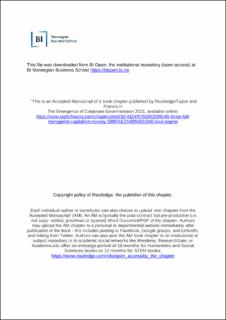The Rise and Fall of Managerial Capitalism in Norway, 1895-1940
Chapter
Accepted version
Permanent lenke
https://hdl.handle.net/11250/3002559Utgivelsesdato
2021Metadata
Vis full innførselSamlinger
- Book chapters [38]
Originalversjon
In Sogner and Colli (eds.)(2021).The Emergence of Corporate Governance. Chapter 3, Routledge 10.4324/9781003009146-4Sammendrag
This chapter argues that Norwegian managers at the turn of the last century actively used the emerging division of ownership and control and thus were creators of Norwegian modern business – and that their role in this has been neglected. It describes the current view of the Norwegian experience of the second industrial revolution. The chapter tracks Norwegian managerial influence in an entrepreneurial phase up to about 1910 and a “coming of age” maturation stage up to the 1920s and slightly beyond. It discusses the setback for the Norwegian managerial surge in the interwar years, when shareholder influence increased and Norwegian businesses and business constellations became smaller. The threat of foreign business domination lurked in the background of the dissolution of the union with Sweden in 1905. Recent scholarship suggests a uniquely Scandinavian collaborative approach to corporate governance since the late nineteenth century that includes a clear perception of management’s role.
